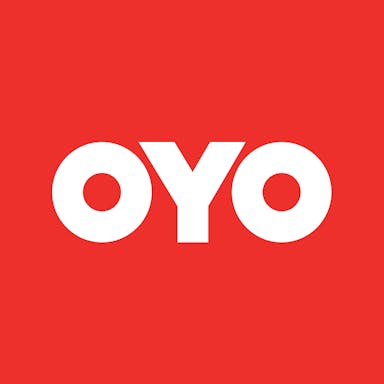Thesis
Domestic tourism in India is booming. The sector’s 44.9% growth between 2022 and 2024 is being driven by an expanding middle class, which has grown 6.3% year-over-year from 1995 to 2021 and will comprise 60% of India’s population by 2050. The Indian middle class is defined as those whose disposable income lies between $6K - $36K. As a result, demand for affordable, accessible accommodations has surged, with spending on domestic tourism expected to hit $140 billion by 2030.
Independent-run hotels dominate India’s hospitality landscape, comprising roughly 72% of the hotel market as of 2024. In comparison, independent hotels comprise only 28% of the hotel market in the US as of 2024. Independent properties in India, known for offering budget and economy lodging, are projected to grow by 6% annually through 2029, particularly in tier-2 and tier-3 cities where tourism is rapidly expanding. In these hotels, the quality of service can be inconsistent, leading to customer uncertainty when booking affordable accommodation.
OYO is a hospitality company that partners with family-run hotels, standardizing amenities like Wi-Fi, air conditioning, and clean linens, and making rooms easily accessible through its centralized digital platform. OYO Rooms addresses fragmentation in India's hotel market by creating a standardized network, improving reliability and consistency for travelers seeking affordable accommodations across India.
Founding Story
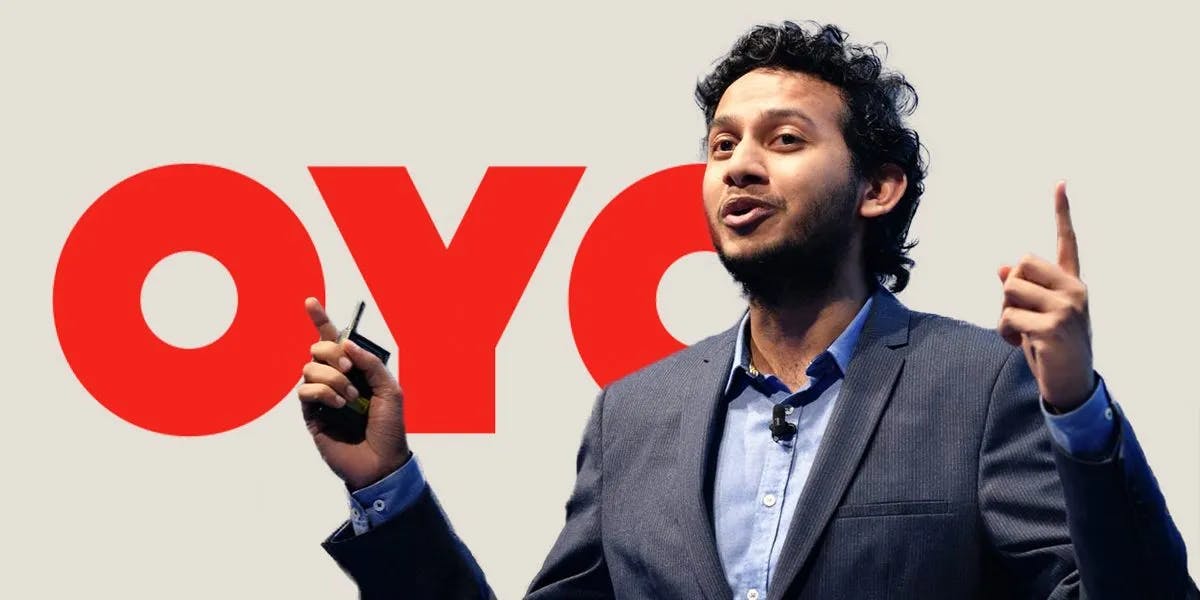
Source: Velocity
In 2012, Ritesh Agarwal (CEO) founded Oravel Stays, a platform that would soon rebrand as OYO, short for “On Your Own” in 2013. The idea emerged when a 17-year-old Agarwal traveled solo across India, staying at over 100 budget accommodations. Agarwal recognized a systemic problem: a massive supply of budget hotels plagued by inconsistent service, poor infrastructure, and a lack of trust. For millions of travelers, affordable did not mean dependable.
Inspired by an opportunity to standardize quality at independently run hotels, Agarwal began sketching out a new kind of hospitality company, one that could standardize the guest experience at family-run hotels by offering consistent amenities while simultaneously helping hotel owners increase occupancy through dynamic pricing and operational support.
Around the same time, Agarwal stumbled across the story of Peter Thiel while watching ‘The Social Network’. Fascinated by Thiel’s contrarian philosophy and belief in young founders, Agarwal dove into research and discovered the Thiel Fellowship, a program offering $100K and mentorship to under-20 entrepreneurs willing to leave college and build companies. With low expectations but a deep desire to learn, Agarwal applied. While Agarwal “had no expectation of getting accepted” into the fellowship, he studied the fellowship’s interviews with senior leaders at Facebook, Twitter, etc.
Ultimately, at 19, after passing several rounds of interviews, Agarwal was invited to fly to the United States – Agarwal’s first international flight – which ultimately led to him being selected as the first resident Asian (i.e., Asian citizen living in Asia) to be awarded the Thiel Fellowship. The $100K grant and access to Silicon Valley’s entrepreneurial ecosystem gave Agarwal the space to fully commit to OYO, dropping out of college and returning to India to work on the company.
Product
Before OYO, India’s independently-run hospitality industry was severely fragmented. As of 2018, nearly 72% of the country’s 2.7 million hotel rooms were unbranded, operated independently by small business owners with minimal tech infrastructure and little to no standardization. While Online Travel Agencies (OTAs) like MakeMyTrip and Booking.com offered a digital front-end, they did little to guarantee quality at the last mile. A traveler could book a room online, only to arrive and discover broken plumbing, missing amenities, or an overbooked property.
OYO tackled this fragmented market head-on by directly onboarding independent hotel owners onto its platform and implementing a standardized operating model: upgraded amenities, brand signage, technology-enabled pricing, and centralized customer service. Hotel owners benefited from increased occupancy and operational guidance, while travelers gained access to clean rooms, Wi-Fi, AC, and 24/7 support at significantly lower prices than comparable 3-star hotels. Frequent discount codes and loyalty programs (like OYO Wizard) further reinforced value for price-sensitive travelers.
As of August 2025, OYO operates a portfolio of brands, from standard “OYO Rooms” to upscale “Townhouse” hotels and vacation rentals, as well as customer and partner programs that drive its go-to-market strategy. Below is a detailed overview of each major product line and initiative, including launch timeline, rollout, key features, target customers, and evolution over time.
OYO Product Offerings
OYO Rooms
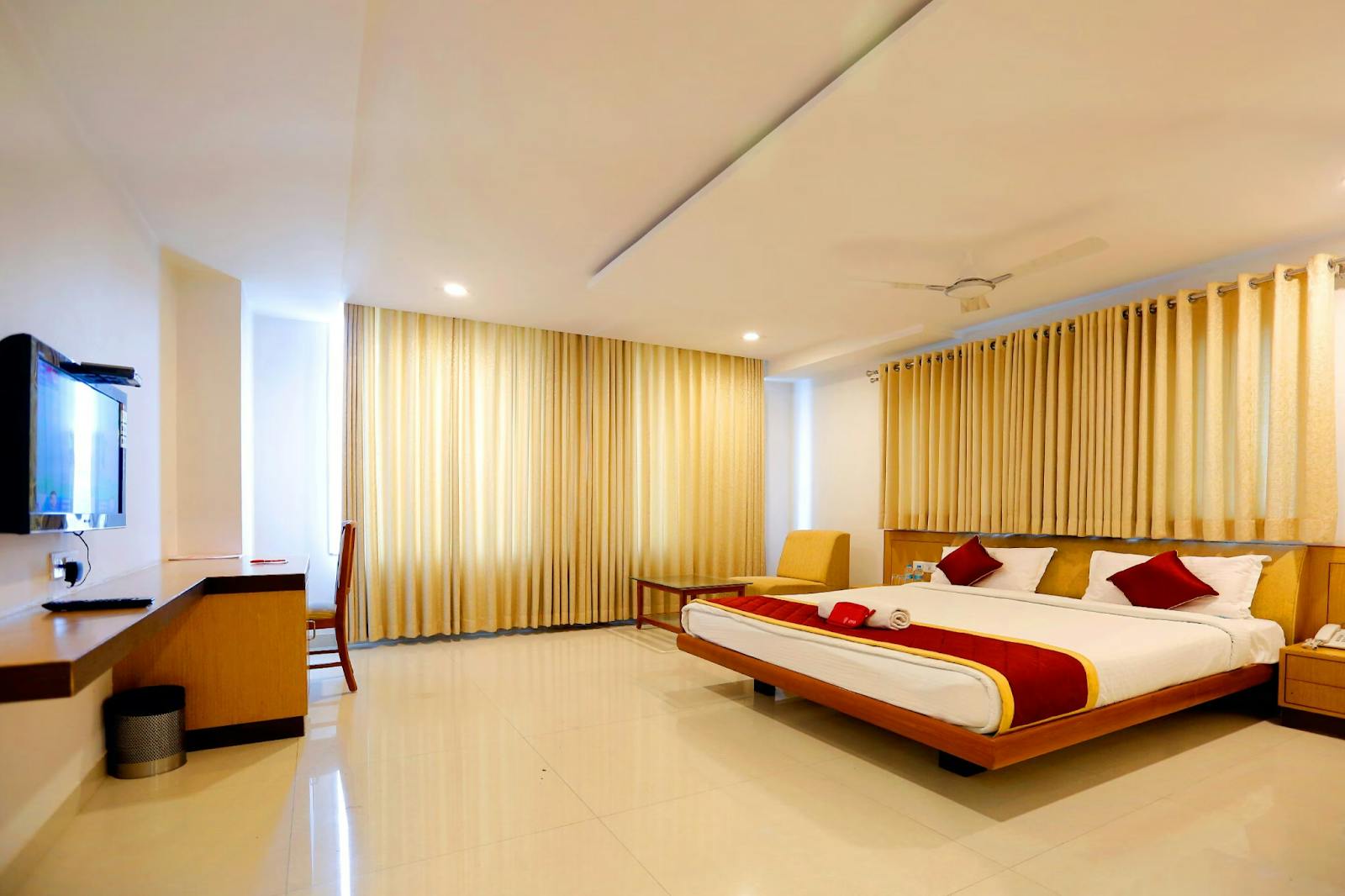
Source: OYO Rooms
OYO Rooms (the core offering of OYO) launched in May 2013 as a network of affordable, standardized budget hotel accommodations. By ensuring a consistent set of amenities and pricing, OYO rapidly scaled across India. By 2015, OYO was operating in 230 cities with over 70K rooms, and it embarked on international expansion in 2016 (starting with Malaysia). Backed by investors like SoftBank, OYO grew to 800+ cities in 80 countries by 2019, including China, the UK, and the US.
In its first few years, OYO Rooms saw explosive growth, becoming a household name for affordable stays. By 2018, OYO was valued at $5 billion and was the fastest-growing hospitality chain in India. Customers embraced the convenience of the app and the improved quality over typical low-end hotels, leading to high repeat usage. Over 90% of OYO’s bookings came from repeat customers in 2018, a strong repeat rate that was leveraged by programs like Wizard (loyalty) to deepen engagement. OYO’s aggressive expansion did coincide with challenges like reports of variable service in some franchises and partner disputes. As of 2024, OYO Rooms remains the company’s primary offering.
OYO Flagship
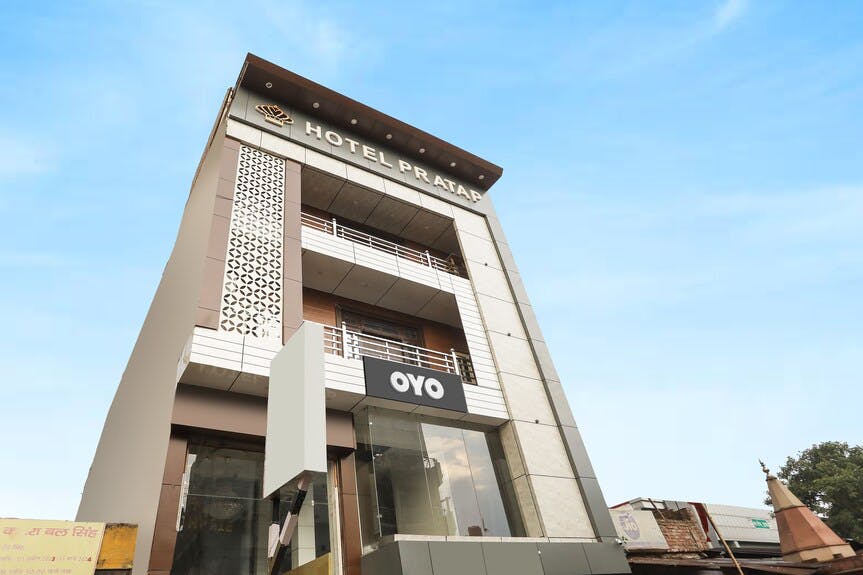
Source: Hotels.com
OYO Flagship was launched in early 2016 as a strategic shift where OYO leased and operated hotels entirely on its own, rather than relying on franchising or partner businesses. Its goal was to improve quality control and deliver a consistent guest experience. The rollout began in metro areas like Gurgaon and Delhi, later expanding to Bangalore and Mumbai.
This initiative marked a tactical pivot for OYO from a pure marketplace to a more traditional hotel chain approach. It was designed to address inconsistencies in service quality caused by non-compliant franchise partners.
The core idea behind Flagship was to provide a homely yet hotel-standard experience, with OYO in full control of design, furnishing, and service. These properties were more upmarket than standard OYO Rooms, with a focus on ambiance and customer service. OYO deployed its own trained staff to manage operations, ensuring consistent, round-the-clock service.
Located in high-traffic areas like business hubs and transit zones, Flagship hotels offered added amenities such as on-site dining, room service, complimentary breakfast, and laundry or food delivery through local vendors or the OYO app. Since OYO owned the entire operation, these hotels offered a more predictable experience in terms of cleanliness, check-in, and room quality.
Positioned between budget and mid-scale, Flagships were priced slightly higher than regular OYO Rooms but remained competitive due to their enhanced reliability. They primarily targeted business travelers and families seeking peace of mind, such as professionals on work trips or families attending events who valued a clean, hassle-free stay with meals available on site.
Financially, the model was more capital-intensive due to leasing costs, but allowed for higher revenue per property. Ultimately, OYO Flagship has served as an experiment with new supply streams that helped the company improve operational efficiency and reclaim control over the customer experience.
OYO Townhouse
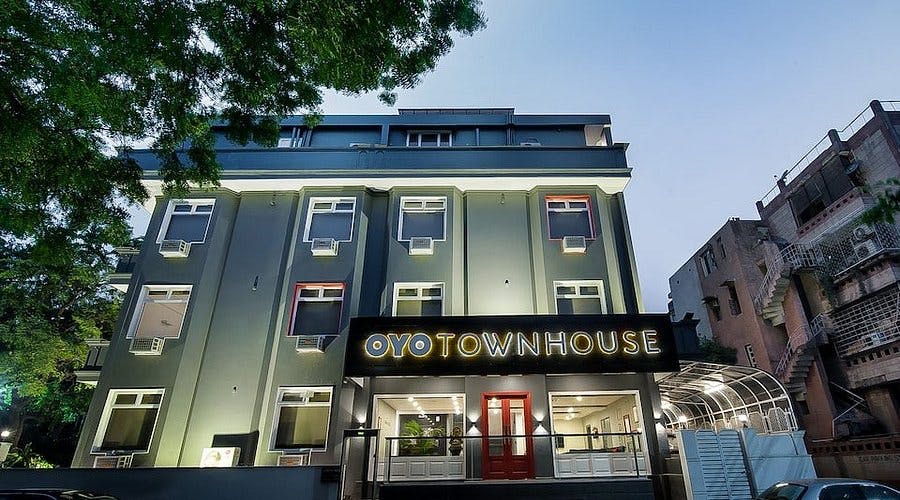
Source: Tripadvisor
OYO Townhouse is OYO’s mid-scale, boutique hotel brand, introduced to move upmarket from the basic OYO Rooms. Launched in January 2017 in India, the first Townhouse properties opened in Delhi and quickly expanded to other major cities. OYO positioned Townhouse as the “friendly neighborhood hotel”, a hybrid between a hotel and a social hotspot. By mid-2019, OYO had 100+ Townhouse hotels across India and had even expanded Townhouse to international markets like the UK and the US. In June 2019, OYO set an aggressive goal to reach 400 Townhouse hotels by the end of 2019, signifying the strategic importance of this brand in its portfolio.
OYO Townhouse hotels are designed as mid-market boutique accommodations with a young, modern vibe. They are described as “hotels, homes, merchandise stores and cafés” all in one. In practice, this means Townhouses feature: stylish interiors and themed common areas, an in-house café or restaurant (often with a 24/7 kitchen), co-working or lounge spaces, and even retail boutiques for travel essentials or merchandise. As of August 2025, Townhouse rooms are typically priced around $30 (₹2.5K) and up per night in India, positioning them as “premium economy” or mid-range options. A key differentiator is the focus on being a social/community space: OYO envisioned locals might even use a Townhouse as a café or meeting spot, not just travelers.
The target market for OYO Townhouse is primarily urban millennials and young professionals. OYO noted that Townhouse was aimed at millennial travelers who are “aspiring for premium economy accommodations”. By offering conveniences like on-site cafes, community lounges, and even printers and meeting rooms, Townhouses are meant to accommodate business travel and off-site meetings, widening OYO’s reach into the corporate segment for SMEs or younger companies.
OYO Townhouse quickly became one of the company’s most successful initiatives. The occupancy levels were high, around 90% on average in 2019, and Townhouse guests reported strong satisfaction, with 82% rating their experience greater than 4/5. By August 2019, Townhouse had launched in 20 cities with endorsement from local officials. Townhouse hotels opened in London and American cities like Dallas and Houston as franchised properties, adapting the concept globally.
OYO Apartments and Homes
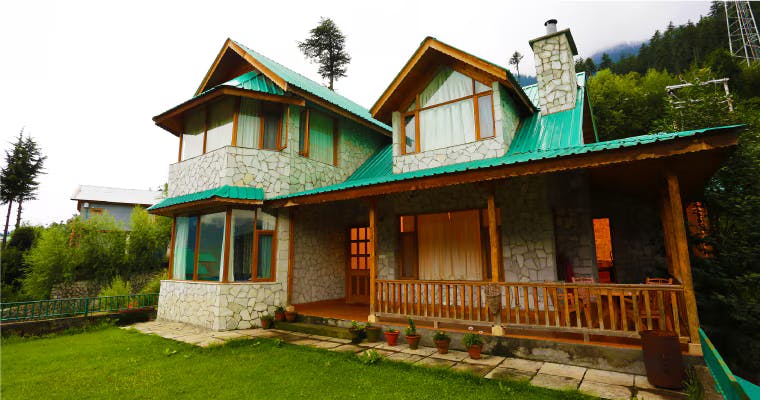
Source: OYO Rooms
OYO’s Apartments and Homes segment refers to full-unit accommodations managed by OYO, providing the comforts of a home or serviced apartment. It promises to deliver the “comforts of home with the convenience and consistency of an OYO hotel”. OYO’s foray into this space began with OYO Home in mid-2017 in India, as a response to the rising demand for homestays and vacation rentals. Stays are flexible, typically available for one night up to 28 nights, bridging the gap between nightly hotel bookings and long-term leases. OYO Home ramped up quickly: within a few months of launch, over 300 homes were onboarded by late 2017 across destinations like Coorg, Kerala, and other popular travel locations in India.
Building on this concept, OYO introduced OYO Apartments in the United States in early 2020 as a new product line for international markets. OYO Apartments averaged $40-$90 per night in 2020 and initially launched in cities in Texas and the Midwest US. OYO has since expanded its apartment offerings to other regions; In 2023, it announced plans to add 2K ready-to-move apartments in Abu Dhabi to cater to long-term expatriate housing demand.
Expatriates and students comprise the core customer segment for OYO apartments: in markets like the UAE and India, OYO began offering fully furnished apartments (often under the sub-brand OYO Life for long-term rentals) to serve professionals looking for ready housing. Tourists looking for authentic local experiences (staying in a villa or cottage) are also target customers. OYO’s homes in resort towns or tourist areas allow travelers to rent an entire home for their group. OYO Home in India initially focused on scenic locations and second-home destinations, tapping into the homestay trend where travelers wanted alternatives to hotels.
The response to OYO’s Homes/Apartments has been generally positive, as it allowed OYO to tap into the lucrative vacation rental market. In India, OYO Home was seen as an attempt to be the “Indian Airbnb”. Globally, OYO’s push in this segment was bolstered by major acquisitions: in 2019, OYO acquired Amsterdam-based Leisure Group (with brands like Belvilla, discussed more under Vacation Homes) to instantly become a major player in Europe.
In the US, OYO Apartments launched just before the pandemic; while expansion slowed in 2020, OYO used the downtime to strategize around long-stay offerings, which were in demand during COVID for quarantine and work-from-anywhere stays. By 2023, OYO was doubling down on longer stays, offering discounted monthly rates and adding thousands of apartments in markets like the Middle East.
WorkFlo by OYO
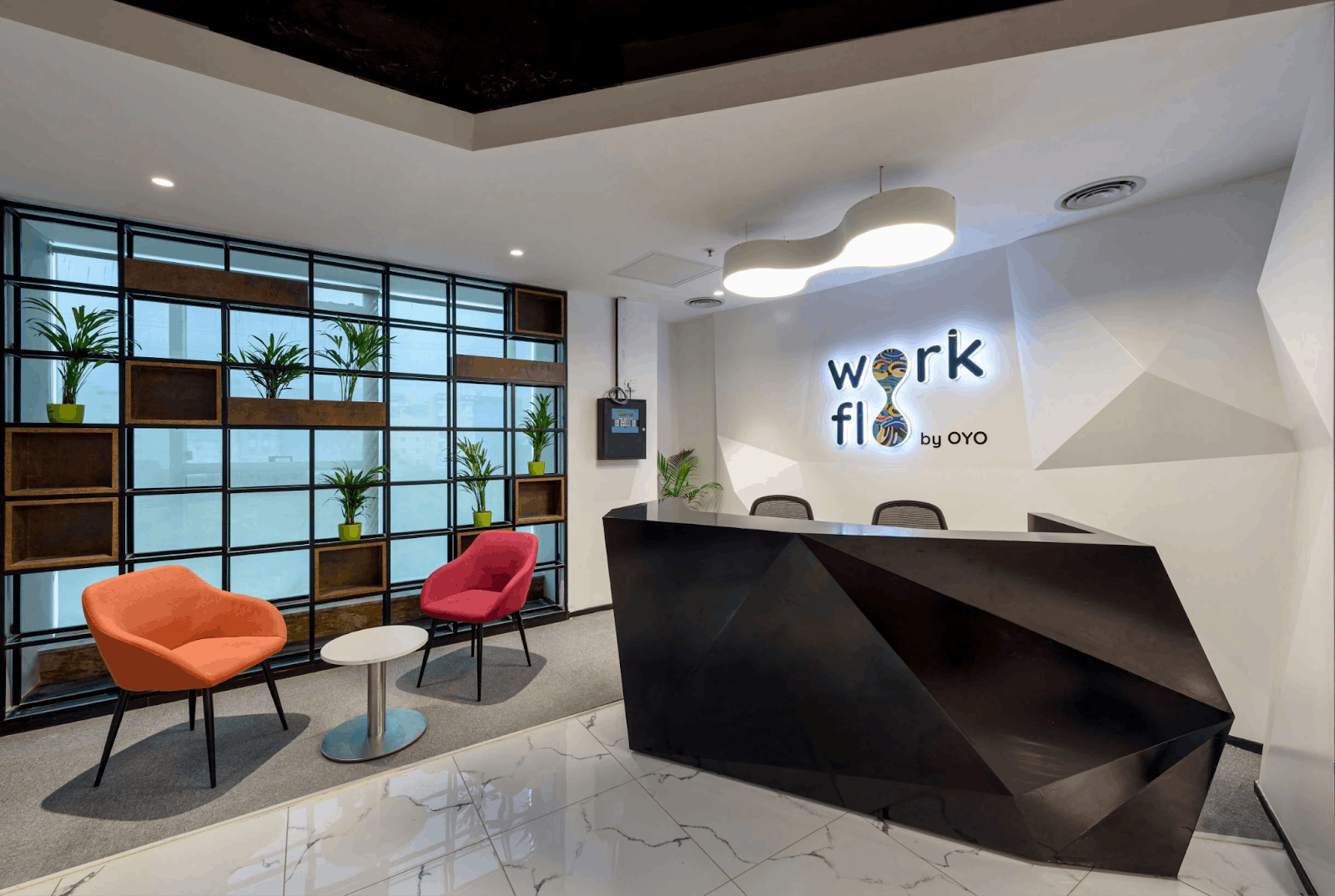
Source: OYO Rooms
In July 2019, OYO officially launched OYO Workspaces, marking its entry into the co-working space sector. The launch was accelerated by OYO’s acquisition of Innov8, a premium co-working startup, which gave the company an immediate presence in the industry. Under the OYO Workspaces umbrella, OYO introduced a tiered, multi-brand strategy:
Innov8: premium coworking centers (retaining the acquired brand)
Powerstation: mid-tier offerings for SMEs
WorkFlo: budget-friendly workspaces aimed at startups and independent professionals
WorkFlo was positioned as an affordable, mass-market brand. By mid-2019, OYO had launched 20 WorkFlo centers and 15K+ seats across major Indian cities, with an ambitious plan to expand to 50 cities by the end of 2019. While the initial focus was on Indian metro cities, OYO hinted at international expansion, though those plans were delayed by the pandemic in 2020.
WorkFlo centers typically involve converting existing office buildings or underutilized commercial spaces into vibrant, modern co-working hubs. Key features included ergonomic workstations (hot desks, private cubicles), high-speed internet, meeting rooms, printing facilities, and stocked pantries. These spaces were designed by OYO’s in-house team to be “beautifully designed, fully managed, and affordable.”
WorkFlo emphasized a service-first experience, offering on-site community managers, IT support, cleaning staff, and app-based booking and space management. Introductory pricing ranged from $75-95 (₹6.5K–8K) per seat per month, making WorkFlo highly competitive in India’s coworking market. OYO’s funding allowed it to subsidize early pricing and scale quickly by repurposing real estate from its hotel network. WorkFlo’s target audience included startups, freelancers, small businesses, and remote teams.
At launch, OYO Workspaces generated significant media buzz as it signaled the company’s diversification beyond hotels. Early reception from startups was strong, driven by low pricing and OYO’s brand reputation. By the end of 2019, OYO Workspaces operated 30+ centers across its three brands, serving thousands of members and becoming one of India’s top three coworking providers by capacity. However, the COVID-19 pandemic in 2020 severely impacted the co-working sector, forcing OYO to scale down operations and re-evaluate WorkFlo’s growth strategy as remote work reduced demand. Despite the setback, OYO did not exit the category. Instead, it cut down on supply by repurposing some centers and launched hybrid offerings, such as “hotels as workspaces, or day-use office setups for individuals.
Go-to-Market Strategies
Underpinning these offerings is a series of go-to-market programs that have played a crucial role in scaling the platform:
OYO Wizard
OYO Wizard is OYO’s loyalty membership program. It was launched in August 2018 as a paid subscription program priced at $1.5 (₹99) for early members. Integrated into the OYO app/website, customers could join Wizard and immediately avail themselves of benefits (booking discounts and perks) on their bookings. Within 10 months of launch, Wizard had already attracted 1.5 million subscribers. By mid-2019, those Wizard members contributed 25% of all OYO bookings in India, scaling rapidly. By 2020, it had over 7.5 million members, making it the second-largest loyalty program in India’s travel/food category.
OYO Wizard is a tiered membership. Key benefits include guaranteed discounts (at least 5% off room tariffs for members at participating hotels), earnable rewards (such as cashback in the form of OYO Money, and discount coupons for future stays), and occasional free room upgrades or late check-outs. OYO also forged partnerships with food delivery or ride-hailing services to provide coupons to Wizard members. Wizard has multiple tiers (Wizard Blue, Silver, Gold, etc.) based on stay count, where higher tiers unlock bigger discounts and priority customer service.
The program covers all OYO brands, including OYO Room, a Townhouse, or even an OYO Home, Wizard benefits apply, making it a comprehensive umbrella for loyalty. In marketing, OYO highlighted that Wizard members could save up to 40% on bookings annually thanks to stacked benefits (base discount, cashback, etc.). Another differentiator was the simplicity: no earning points, instead, instant discounts. Wizard hotels were labeled on the app, so members could easily choose places where their benefits apply (by 2019, over 9K hotels were Wizard-partnered).
OYO Circle
OYO Circle is OYO’s affiliate and influencer marketing program. The program officially went live in December 2018, initially in India and then in the USA and UK. OYO Circle essentially opens up OYO’s platform to digital content creators, bloggers, travel influencers, and even other businesses, allowing them to earn commissions by referring bookings. OYO provides an incremental commission structure: the more bookings a partner drives, the higher their earnings per booking can become. This incentivizes sustained promotion. The concept was a win-win-win: customers referred through Circle partners get special discounts, the partner earns a commission, and OYO gains a new booking it might not have gotten otherwise.
The rollout included a dedicated website (oyocircle.com) and an onboarding process where interested partners could sign up or request an invite. Within the first year, OYO Circle amassed over 1K active partners in India alone, and hundreds more in other regions, reflecting strong interest from content creators. By early 2020, OYO Circle partners (affiliates + influencers) had a collective reach of over 80 million people through their audiences. OYO Circle was one of the first large-scale affiliate programs in the Indian hospitality sector, modeled somewhat after online retail affiliate programs but unique for hotels.
OYO Frames
To standardize visual branding across properties, OYO built a network of over 500 photographers globally. Each new partner property receives professional, consistent photography, helping users book hotels with confidence.
Market
Customer
OYO primarily serves budget-conscious travelers seeking consistency, affordability, and convenience. Its core customer segments include young professionals, small families, business travelers, and domestic tourists. A key differentiator for OYO has been its appeal to previously underserved or excluded segments like unmarried couples, who often faced rejection from traditional hotels, or travelers heading to pilgrimage sites and tier-2 cities where quality accommodations were limited.
These customers share a common set of needs, including convenience through mobile booking and efficient check-in/check-out processes, basic comfort ensured by standardized amenities such as Wi-Fi, air conditioning, clean linens, and 24/7 customer support, affordability with OYO properties, and location relevance, particularly in areas where branded hospitality options were previously scarce.
OYO reaches these customers primarily through direct B2C channels like its app and website, but has also built a growing B2B2C network of over 5.3K travel agency partners in India (150% YoY growth in FY23) and supports corporate travel managers booking rooms for employees or clients. The dual-channel distribution model gives OYO high visibility in both digital and traditional booking ecosystems.
Market Size
Indian Markets
India remains OYO’s most important market, accounting for the majority of its revenue and property network. As of 2023, the TAM for the Indian hospitality industry stood at $32.1 billion, with projections suggesting this will grow to $59-60 billion by 2030, reflecting a CAGR of roughly 9-12%. Notably, budget and mid-tier hotels make up approximately 72% of the Indian hotel market by volume as of 2024, squarely aligning with OYO’s core positioning.
India recorded 2.5 billion domestic tourist visits in 2023, the majority of which did not involve formal hotel stays. Many of these travelers, including pilgrims, migrant workers, and family visitors, have historically stayed in unorganized accommodations or with relatives. By introducing reliable, affordable branded lodging into tier-2 cities, pilgrimage hubs, and rural transit points, OYO is expanding the definition of its addressable market. As the Indian middle class grows, disposable incomes rise, and infrastructure (such as national highways and high-speed rail) improves, the likelihood of these travelers converting into paying hotel customers increases.
Global Markets
The global hotel & resort industry generates about $1.5 trillion as of 2024, so the worldwide opportunity is immense. Outside India, OYO has operated in over 80 countries, including strategic expansions into China, Southeast Asia, and Europe. While some international operations have since scaled down, OYO continues to maintain a global footprint in key hospitality regions with a focus on budget-conscious travel.
Competition
Airbnb: Airbnb, which was founded in 2007 in San Francisco, is the world’s leading travel hospitality platform by market share (29% globally as of 2025). Airbnb allows users to book short-term home-sharing and alternative accommodations, offering vacation rentals, boutique stays, and increasingly, hotel-like offerings through its global marketplace. While not a direct hotel franchisor like OYO, Airbnb competes for budget-conscious travelers seeking flexible, local, or affordable lodging.
The company went public in December 2020 and trades on the NASDAQ under the ticker ABNB, with a market cap of $77.5 billion as of August 2025. Before its IPO, Airbnb raised $6.4 billion, with major investors including Sequoia Capital, Andreessen Horowitz, Founders Fund, DST Global, and Tiger Global.
While both Airbnb and OYO are asset-light platforms that rely on trust and tech infrastructure, Airbnb primarily focuses on individual homeowners and unique stays, whereas OYO is more focused on standardizing hotel supply. In India, where Airbnb’s presence is mostly limited to vacation homes and homestays, a traveler in destinations like Goa or Himachal might weigh an Airbnb room against a nearby OYO guest house. Airbnb contributed over $840 million to India’s GDP and created 85K jobs in 2022. The platform experienced nearly a 30% year-over-year increase in nights booked in India in 2023, with Gen Z travelers accounting for 90% of first-time bookings.
Treebo Hotels: Treebo Hotels, founded in 2015 in Bangalore, is a budget hotel franchising and hotel management SaaS provider that operates on an asset-light model. It partners with small, independent hotels, brings them under the "Treebo" brand, and offers both a quality assurance checklist and a proprietary property management software called Hotel Superhero. The company has raised approximately $85 million in funding across multiple rounds. As of August 2025, the latest round was a $16 million Series D in mid-2021, led by Accor.
FabHotels: FabHotels, founded in 2014 in Gurgaon, is a franchised budget hotel network focused on the 2-star to 3-star segment, operating across India’s major cities. It follows an asset-light model like OYO, partnering with independently owned hotels (typically 20-40 rooms) and operating under the “FabHotels” brand. The company has raised $68 million as of August 2025. Its latest round was a $20 million Series C in September 2023, led by Panthera Growth Partners, with continued participation from Accel. Earlier investors include Goldman Sachs, Accel India, and Qualcomm Ventures.
As of its September 2023 funding round, FabHotels was valued at approximately $140 million post-money. While it competes directly with OYO in terms of pricing and location, FabHotels typically avoids ultra-low-cost segments and instead positions itself in the upper end of the budget category, appealing to travelers looking for more consistent, slightly upscale stays at affordable prices.
Business Model
OYO operates as a two-sided marketplace, connecting independent hotel owners (supply side) with budget-conscious travelers (demand side) through their platform. On the supply side, OYO approaches small hotel owners and offers to franchise their property under the OYO brand. In exchange, it provides a suite of services including standardized operating protocols, access to dynamic pricing tools, digital marketing, centralized booking infrastructure, and guest support systems.
In return for these services, OYO earns revenue primarily through commission-based fees. According to company disclosures, OYO typically takes a 20% commission on the gross booking value of each stay. The exact percentage varies depending on the services utilized: hotels that receive additional support, such as linens, IoT-enabled smart locks, or staffing assistance, may pay a higher cut. Over time, OYO has shifted almost entirely to this franchise fee model, with approximately 90% of revenue now coming from commissions paid by hotel partners. OYO achieved its first full-year profit in FY 2023-24, indicating a maturation of the business model.
Beyond commissions, OYO monetizes its platform through several ancillary revenue streams:
Guest fees: In some cases, OYO charges travelers a small reservation or service fee at the time of booking.
OYO Wizard: A paid membership program that offers users exclusive discounts and early access to deals. This model allows OYO to generate recurring annual revenue from a loyal customer base.
A core enabler of OYO’s monetization strategy is its dynamic pricing engine. Room rates on the platform are automatically updated in real time based on a variety of factors, including location-specific demand, current occupancy rates, seasonal variation, and competitor pricing. During peak operations, OYO’s data science team reported updating prices for over one million rooms more than 50 times per day, ensuring optimal utilization and revenue generation for both OYO and its partners.
Traction
OYO has scaled significantly since its founding, both in terms of customer reach and platform engagement. According to the most recent publicly available figures, the company has served over 180 million guests from 120+ nationalities, reflecting a broad and diversified user base with no dependence on any single geography or client segment.
On the digital front, OYO has built one of the most downloaded hospitality apps in the world. By 2021, the OYO app had surpassed 100 million downloads, making it a significant component of OYO’s platform for hotel discovery and booking.
Loyalty has also been a focus. OYO’s “Wizard” membership program, which offers exclusive discounts and priority access to deals, has grown to over 9.2 million members, helping the company drive repeat bookings and build a more predictable revenue base.
Valuation
OYO has raised approximately $3.6 billion in total funding as of April 2025 through a combination of equity and debt, backed by prominent global investors including SoftBank Vision Fund, Sequoia Capital, Lightspeed Venture Partners, and Microsoft.
The company’s early valuation gains were rapid. In May 2014, OYO raised $650K from Lightspeed and DSG Consumer in a seed round. Subsequent Series A-D rounds with major activity from Peak XV, Lightspeed, and SoftBank helped OYO raise just shy of $500 million by 2017. By September 2018, a $1 billion Series E round from SoftBank, Sequoia, and Lightspeed brought OYO’s valuation to $5 billion. Just a year later, in October 2019, the company reached its peak valuation of $10 billion following a $1.5 billion Series F round.
However, OYO’s valuation began to decline shortly after. Operational challenges, retrenchment from some international markets, and increased scrutiny of its business model led to a softening of investor sentiment. In 2021, OYO raised $660 million through a Term Loan B offering to refinance existing debt, and Microsoft made a $5 million strategic investment at a reported valuation of around $9 billion.
The downtrend continued in 2022 when lead investor SoftBank reportedly marked down OYO’s internal valuation to $2.7 billion. This trend continued into 2024 when OYO raised a $125 million equity round at a valuation of $2.5 billion, its lowest publicly reported mark since 2017.
OYO had initially filed for an IPO in 2021 with ambitions of a $12 billion public market valuation. However, the company delayed its plans amid market volatility and eventually withdrew its IPO filing again in 2024, citing a focus on improving profitability and further refinancing efforts.
Key Opportunities
Rapid Expansion in Domestic Tourism
Organic Expansion
India’s domestic tourism sector has experienced rapid growth since the COVID-19 pandemic, reaching 2.5 billion trips in 2023. This surge has been driven by rising disposable incomes, government investments in regional infrastructure, and enhanced connectivity. OYO is well-positioned to capitalize on this growth due to its extensive network in tier-2 and tier-3 cities, areas traditionally underserved by major hotel chains.
Government Promotion of Tourism
Promotional initiatives such as the annual "Dekho Apna Desh" campaign, which was first launched by the Ministry of Tourism in 2020 to significantly boost domestic tourism, also provide opportunities for OYO to grow. As part of this initiative, the government committed to promoting 100+ domestic tourist destinations through extensive multimedia campaigns, organizing nationwide webinars and workshops, and incentivizing local travel through reward-based tourism certificates. At the program’s launch, OYO published a Road Tripping Campaign dubbed “Road Trippin” under the #DekhoApnaDesh tag. However, only months into the campaign, COVID-19 reached India, launching a nationwide lockdown.
As India bounces back from the COVID-19 pandemic’s effects on tourism, OYO may be in an opportune position to take advantage of the revitalized Dekhi Apna Desh campaign, using the increased enthusiasm in domestic tourism to its advantage.
Increased Adoption of Digital Bookings
India's rapidly growing base of over 650 million smartphone users as of October 2024 is accelerating the transition toward digital booking platforms in travel. More importantly, as a result of the “Jio Revolution” that has offered phones and SIM cards to Indian citizens at extremely affordable prices, low and middle-class Indian citizens who comprise OYO’s target demographic now have access to the internet. With over 100 million app downloads, OYO’s mobile-first strategy and integrated loyalty programs enable it to leverage this digital shift. Consumers increasingly prefer mobile platforms for travel planning, bookings, and service management due to convenience and immediacy. OYO’s technology infrastructure, designed specifically for seamless digital engagement, places the company at an advantage as the market continues to move away from traditional offline booking methods.
Key Risks
Hotel Partner Dissatisfaction and Operational Challenges
OYO has historically faced significant friction with its hotel partners, stemming primarily from disputes related to high commission rates of around 20%, delayed payments, and enforced discount policies. These tensions culminated in over 500 hotel partners exiting the platform in 2019 alone. The persistent dissatisfaction among partners presents a substantial operational risk, as continued churn can directly diminish the supply of accommodations available through OYO's network, negatively affecting its market share, brand reputation, and growth potential. Unless OYO can find a way to sustainably reduce churn and the underlying challenge of keeping partners satisfied, it risks losing its supply of accommodation.
Regulatory and Legal Scrutiny
OYO has been subject to ongoing regulatory scrutiny, notably facing formal complaints from the Federation of Hotel & Restaurant Associations of India (FHRAI) in 2019. These complaints allege predatory pricing tactics and unfair contractual practices. These investigations could lead to regulatory action impacting OYO’s operational flexibility, particularly concerning pricing and franchising practices. Although OYO received interim relief from the Delhi High Court, the possibility of stringent regulatory measures remains a significant risk. Compliance challenges or adverse regulatory decisions could force substantial modifications to OYO’s current business model, potentially limiting competitive pricing strategies and slowing network growth.
Summary
India’s rapidly expanding domestic travel market and increasing digitization have created favorable conditions for budget hotel platforms. OYO’s position at the intersection of fragmented supply and mobile-first consumer behavior allows it to serve a growing base of cost-conscious travelers.
The company has built significant reach through its franchise-led model and large distribution footprint, but friction with hotel partners and regulatory scrutiny continues to pose risks to long-term scalability. The open question is whether OYO can balance operational control and partner satisfaction while sustaining growth in an increasingly formalized and competitive market.
